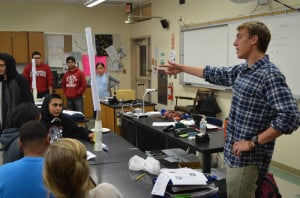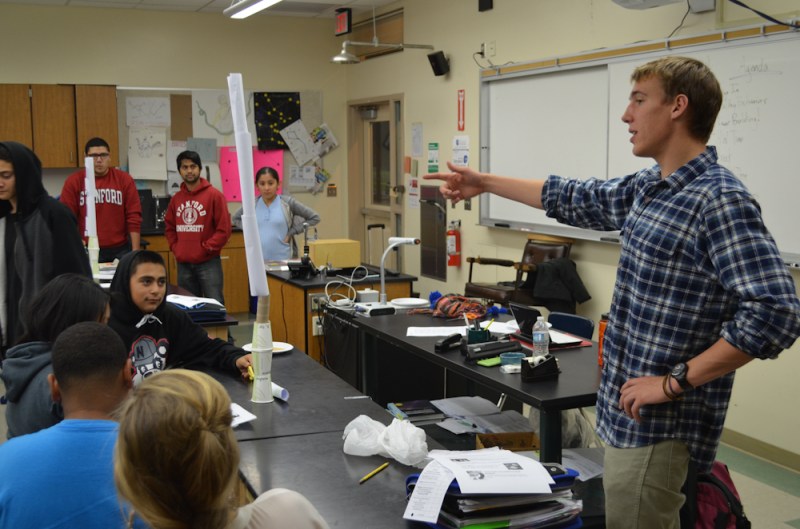
Making guacamole and playing tennis, at first glance, seem odd complements to tutoring programs. But both activities act as part of the community-building mission of volunteer, Stanford-based tutoring groups that target underprivileged local youth.
DreamCatchers, a local tutoring program, and the Stanford-run East Palo Alto Stanford Academy provide free assistance to youth in the area. Both programs try to provide a more holistic learning experience – focusing on study skills and healthy living, for example – in addition to academic help.
Others tutoring companies, like Cardinal Learning Services, hire paid tutors and cater to a more affluent clientele able to pay an hourly rate. Tutors who work for Cardinal Learning Services, which mostly serves students at Palo Alto and Henry M. Gunn High Schools, get paid between $20 and $50 per hour.
All these companies rely on Stanford student tutors, usually undergraduates.
“The people who commit to tutoring are really enthusiastic about the program, they’re really excited to be able to make a difference in the lives of the kids,” said Joseph Lester B.A. ’11 M.A. ’12, who volunteered with East Palo Alto Tennis and Tutoring (EPATT) for four years before becoming EPATT operations manager.
But with so many organizations serving the area, companies often find it necessary to differentiate themselves in order to attract employees and clients.
“There’s definitely a lot of competition. The market is saturated, and every tutoring company has a different approach,” said Maria Barrera ’13, co-founder of Cardinal Learning Services.
One option is marketing the career preparation aspect of tutoring.
“A lot of our classroom directors have already gone on to organizations like Teach for America,” said DreamCatchers Founder Sarah Mummah B.S. ’10.
Another is substituting an academic-only tutoring track for a mix of academic programs and extracurricular programs. EPATT, for example, offers tennis lessons alongside their tutoring services and DreamCatchers recently incorporated a healthy eating initiative into their afterschool program in which students make guacamole.
“The overarching goal is to build a really positive, tightknit community for the kids in an afterschool place where they might not otherwise have it,” Mummah said about DreamCatchers’ goal of creating a sense of community for students, many who are from low-income backgrounds.
EPATT’s tennis program plays a comparable role in extending the program’s influence beyond the scholastic.
“Tennis is used as a way to teach life skills to our students,” Lester said. “When you’re playing, you’re put in an environment where you have to work hard, you have to practice, you have to prepare, and in tennis specifically you’re out there on your own. You have to have that self confidence, that self belief. Learning how to do that in life is a big asset and a big skill for our students to learn.”
In addition to diversifying their programming, tutoring groups aim to promote strong tutor-tutee relationships. When it comes to tutoring, these relationships can make or break the success of the students.
“[EPATT] is not just a tutoring program; we like our tutors to build a relationship with their tutee,” Lester said. “We have events outside of tutoring that we encourage tutors to come to and build a relationship with their tutee. For example, we’re having a dinner where we’re taking our students and all of their tutors to Stanford dining halls, and they’ll go see a dorm room afterwards.”
Barrera founded Cardinal Learning Services after noticing that the tutoring companies she worked with put very little effort into matching their tutors with clients. In response, Barrera implemented an intensive matching process for the students she serves.
“It’s been really successful in that tutors actually stick with their students, because they can academically handle it, they know the subjects that are being taught,” Barrera said. “At the same time, because we match them based on interests or personality traits, that helps foster the relationship.”
Tutors emphasize it is the personal satisfaction of working with younger students that makes their commitments worth their time.
“Once I saw the program and the impact of being able to sit next to an [EPATT] student and watch them go from not really wanting to be there, to by the end of the year driving the sessions, being really excited to see me, and really excited to succeed academically – that’s a big motivator,” Lester said. “It’s being able to see the difference you can make in someone’s life.”
